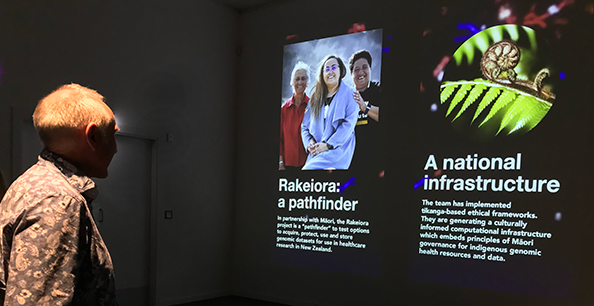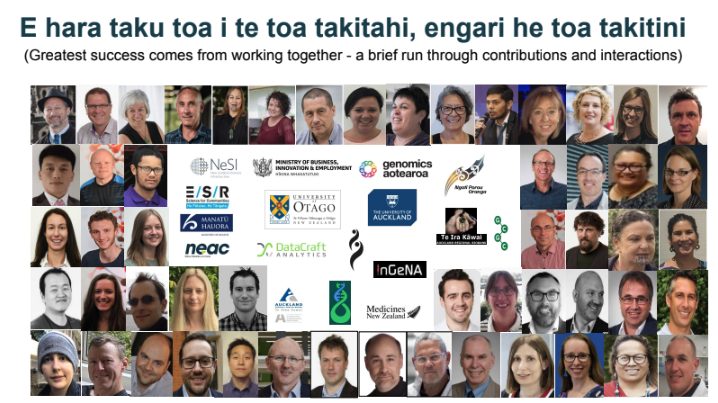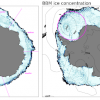Building a platform that brings us closer to precision health research in Aotearoa

Rye, C. E., Puketapu-Watson, H., Wihongi, H., Aika, B. T., Macartney-Coxson, D., de Ligt, J., Print, C. G., Le Quesne Stabej, P., Tsai, P., Curran, B., Jones, N., Huh, J., Perkins, E. O., Pestle, M., Zhao, K., Halytskyy, Y., Robertson, S. P., Halliday, B. J., Goodin, E., Markie, D. M., Lamont, A., & Wilcox, P. (2025). Rakeiora Genomics Platform: a pathfinder for genomic medicine research in Aotearoa New Zealand. Journal of the Royal Society of New Zealand, 1–25. https://doi.org/10.1080/03036758.2025.2469626
The Rakeiora program was designed for high-impact precision health research in Aotearoa New Zealand. It required a genomics platform to facilitate linkage of whole genome DNA sequencing data, healthcare records, and mātauranga whakapapa (genealogical knowledge) in a powerful, secure, and transparently governed computational environment.
Since 2021, NeSI has contributed to the design and development of analytical and storage components that will underpin this platform for genomic and clinical data. A new paper published by the Rakeiora team describes the development of the program's bespoke data access and analysis platform, and applications in precision health research.

Collaboration through tikanga-led co-design
Rakeiora is a collaboration between the University of Otago, Ngāti Porou Oranga, Ira Tātai Whakaheke, Institute of Environmental Science and Research (ESR), Waipapa Taumata Rau University of Auckland, Genomics Aotearoa, and co-led with Māori partners.
A team of Māori and non-Māori with diverse professional and cultural expertise co-developed Rakeiora. Embedding te ao Māori (Māori world) was crucial, including principles derived from:
- tikanga Māori (Māori traditional rules, values, culture),
- Te Tiriti o Waitangi (agreement between the British Crown and many Māori chiefs), and
- data sovereignty.
A key asset were the Tikanga Attributes, developed first by Ben Te Aikā (Ngāti Mutunga, Te Ati Awa, Kāti Wairaki, Kāti Mamoe, Waitaha), Rakeiora Project Manager and member of Rakeiora leadership, and Kaiwhakatere Rakahau Māori, Māori Research Partnerships Manager, Office of Research and Enterprise at University of Otago / Ōtākou Whakaihu Waka. These Tikanga Attributes were then discussed and iteratively modified by other Māori team members.
The attributes were articulated in the English language alongside kupu Māori, in a sufficiently granular and technical manner so that other team members, particularly those responsible for developing the computational infrastructure, could select appropriate software tools to uphold them. This internationally unique prospective hard-wiring of Indigenous values into a computational platform created a robust infrastructure which benefits all participants.
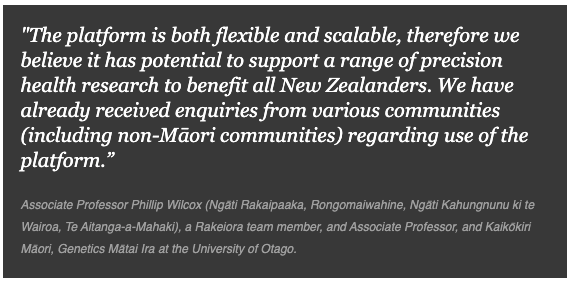
Across NeSI, we are humbled and grateful to have been part of this project and take great pride in how both the collaboration approach and infrastructure was shaped by our Māori partners, with much generosity.
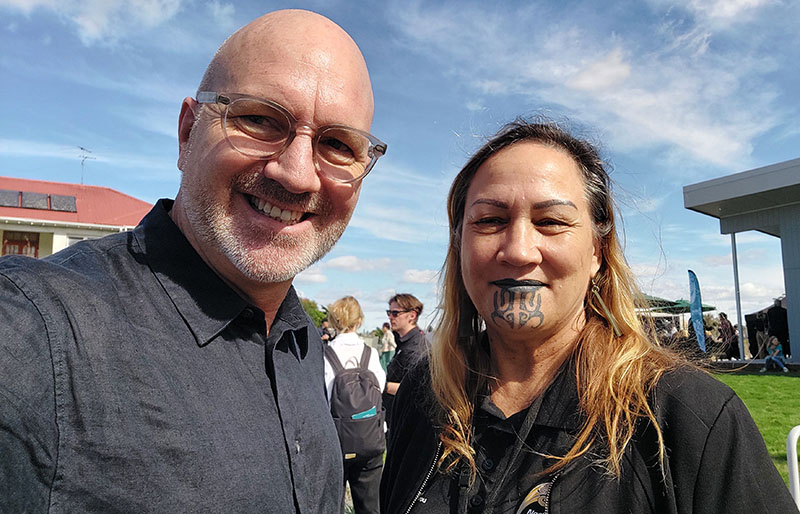
NeSI joined the collaboration in 2021 and delivered an initial prototype in 2022.
NeSI Director Nick Jones (Ngati Kahungunu ki te Wairoa, Pakeha) notes that during these initial phases, “we recognised this programme is successful because its a full partnership with its constituent communities. It is led by Māori, and achieves impact through tikanga Māori-informed approaches. Supporting a tikanga-led approach was challenging for our mostly non-Māori team, though ultimately has been one of the most inspiring and rewarding parts of the journey. The Rakeiora platform holds opportunity for many communities as it responds to a common need for greater control of personal health data. This helps us overcome a key barrier as we move into a new age of precision medical research.”
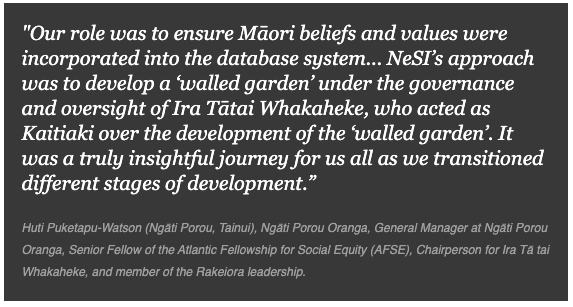
Applications to precision health
Nationally, learnings from this collaboration are informing discussions and policy around tools and processes that specifically help address significant inequities in health care in Aotearoa New Zealand.
The 2022 Medicines New Zealand Parliamentary Dinner discussed why New Zealand needs to embed a precision health approach and genomic medicine into its health system. Experts returned in 2023 to explore progress a year later, and the Rakeiora project featured prominently as a case study.
Manatū Hauora’s Long-term Insight Briefing, tabled in Parliament in August 2023, spotlighted the Rakeiora project as an example of the role technology and information can play in keeping people healthy.
“The integration of indigenous values into a national research infrastructure in this way is internationally unique... Lessons from this project could powerfully inform the impact of genomics on health outcomes in Aotearoa New Zealand and the conditions and enablers required to position genomics to achieve health equity into the future.”
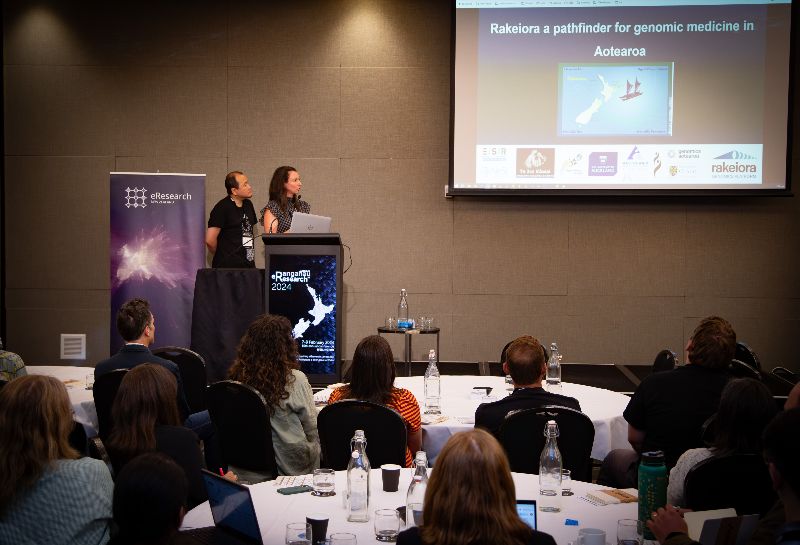
Opening doors to other collaborations
For NeSI, participation in the Rakeiora programme has fed valuable learnings into other projects and opened doors to new partnerships, including:
- ongoing co-development with Genomics Aotearoa of the Aotearoa Genomic Data Repository
- knowledge-sharing of research software and data management practice and tools through Gen3 Community Forums
- attending and participating in Indigidata Aotearoa Wānanga
- attending our first Global Alliance for Genomics and Health (GA4GH) conference
We appreciate the opportunities to engage more deeply within these communities, being responsive to their needs for specific research-led capabilities.
A collaborative milestone
As seen by individuals and organisations pictured above, this project wouldn't be possible without the collaboration, guidance, and efforts of many. Congratulations to all involved. It's been rewarding to work alongside you.
For more information about the Rakeiora project, read the paper here or learn more on the Genomics Aotearoa website.
